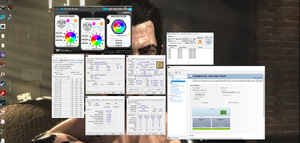SixFootDuo
Supreme [H]ardness
- Joined
- Oct 5, 2004
- Messages
- 5,825
Client wants a heavy lifting workstation for 10+ hour renders, simulation, etc - Solidworks, Siemens NX 11 and CAMWorks etc.
Specs below.
I've built a number of these machines but always looking for a new thought process / suggestions others might share. There is always room to learn.
I built out a few Epyc and Xeon builds on paper but I really just want to go with the 4.5ghz I expect to get with the 7980XE across all 18 cores.
Budget is not an issue. This particular client will write a check for any amount but I'm really not sure we need to spend much more for what his Engineer will use.
Anyone have experience with 3Dconnextion products? I see them in a lot of the offices I visit. I see A LOT of these on desks. I normally just supply keyboards and mice for input. I thought we could make an attempt at streamlining his workflow since I'm told he is working 12 and 14 hour days on a new Ford program. 850,000 units.
Intel Core i9-7980XE 18 Core / 36 Treads @ 4.5Ghz
Asus X299 LGA-2066 Board, 2nd Version ( Mark2 )
64gb DDR4 2666 Ram ( 4 x 16 )
nVidia Quadro P4000 8GB DDR5 PCIe16x
1TB Samsung 960 Pro SSD NVMe Drive.
Corsair AIO H150i Pro
Full Tower Case
Seasonic 1000watt Platinum Rated PSU
3Dconnextion SpaceNavigator Mouse and 3Dconnextion Cad Mouse
Slimline comfort keyboard
Windows 10 Professional.
USB DVD
1TB Mechanical Storage
64gb USB Rescue media
Specs below.
I've built a number of these machines but always looking for a new thought process / suggestions others might share. There is always room to learn.
I built out a few Epyc and Xeon builds on paper but I really just want to go with the 4.5ghz I expect to get with the 7980XE across all 18 cores.
Budget is not an issue. This particular client will write a check for any amount but I'm really not sure we need to spend much more for what his Engineer will use.
Anyone have experience with 3Dconnextion products? I see them in a lot of the offices I visit. I see A LOT of these on desks. I normally just supply keyboards and mice for input. I thought we could make an attempt at streamlining his workflow since I'm told he is working 12 and 14 hour days on a new Ford program. 850,000 units.
Intel Core i9-7980XE 18 Core / 36 Treads @ 4.5Ghz
Asus X299 LGA-2066 Board, 2nd Version ( Mark2 )
64gb DDR4 2666 Ram ( 4 x 16 )
nVidia Quadro P4000 8GB DDR5 PCIe16x
1TB Samsung 960 Pro SSD NVMe Drive.
Corsair AIO H150i Pro
Full Tower Case
Seasonic 1000watt Platinum Rated PSU
3Dconnextion SpaceNavigator Mouse and 3Dconnextion Cad Mouse
Slimline comfort keyboard
Windows 10 Professional.
USB DVD
1TB Mechanical Storage
64gb USB Rescue media
![[H]ard|Forum](/styles/hardforum/xenforo/logo_dark.png)


